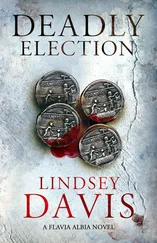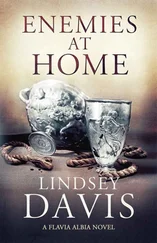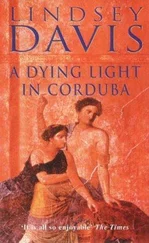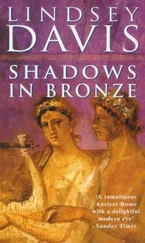Lindsey Davis - Alexandria
Здесь есть возможность читать онлайн «Lindsey Davis - Alexandria» весь текст электронной книги совершенно бесплатно (целиком полную версию без сокращений). В некоторых случаях можно слушать аудио, скачать через торрент в формате fb2 и присутствует краткое содержание. Жанр: Исторический детектив, на английском языке. Описание произведения, (предисловие) а так же отзывы посетителей доступны на портале библиотеки ЛибКат.
- Название:Alexandria
- Автор:
- Жанр:
- Год:неизвестен
- ISBN:нет данных
- Рейтинг книги:4 / 5. Голосов: 1
-
Избранное:Добавить в избранное
- Отзывы:
-
Ваша оценка:
- 80
- 1
- 2
- 3
- 4
- 5
Alexandria: краткое содержание, описание и аннотация
Предлагаем к чтению аннотацию, описание, краткое содержание или предисловие (зависит от того, что написал сам автор книги «Alexandria»). Если вы не нашли необходимую информацию о книге — напишите в комментариях, мы постараемся отыскать её.
Alexandria — читать онлайн бесплатно полную книгу (весь текст) целиком
Ниже представлен текст книги, разбитый по страницам. Система сохранения места последней прочитанной страницы, позволяет с удобством читать онлайн бесплатно книгу «Alexandria», без необходимости каждый раз заново искать на чём Вы остановились. Поставьте закладку, и сможете в любой момент перейти на страницу, на которой закончили чтение.
Интервал:
Закладка:
XI
For a moment it went wrong. There were two mortuary assistants; Aulus subsequently named them Itchy and Snuffly – a dark, pudding-faced, slow-moving dreamer and an even darker, thin-featured, jumpy fellow. While Petosiris stood trapped, once they got over their surprise they reacted. Itchy stopped scratching and squealed with hysteria. It was annoying but harmless. Snuffly was the trier. He leapt on me, knocked me over and sat astride my chest. A gleeful leer said he was going to demonstrate how they removed dead men's brains with their nose-hook.
While he waved this extractor, he foolishly left my arms free. I parried the hook as it threatened my nostrils, then punched him in the throat. These fellows were used to passive customers. He was taken aback. I bucked violently, forced him aside, struggled upright and when he refused to surrender, I hit him harder. Snuffly went out like a pinched wick. I laid him on the bier beside the body of the man Aulus had called a cucumber-seller, leaving him to recover in his own time.
Itchy was wondering feebly whether he too should be an action man. I pointed to him, pointed to his unconscious colleague and shook my head slowly. This proved to be international sign language.
Wincing, I examined the nose-hook.
'Nasty!' remarked Aulus to me. 'How much not to tell my sister you were nearly mummified?'
We both then tackled Petosiris. It was short; we were irritated and brutal. After pretending he had no idea he had shown us the wrong corpse, he admitted that Theon's body was expected here later, but had yet to be brought to him.
'Why did you need to lie about it?'
'I don't know, sir.'
'Somebody told you to?'
'I can't say, sir.'
I asked where Theon really was. As far as Petosiris knew, still at the Museion.
'Why would that be?'
Petosiris reluctantly admitted why, and then we understood the reason people had wanted him to try to bamboozle us: 'They are conducting a ''See for yourself''.'
Aulus scoffed. 'An autopsy? I don't think so, man!' He became the self-righteous legal scholar: 'Under Roman Law. the medical dissection of human remains is illegal.'
'Well, this is Egypt!' countered Petosiris proudly.
XII
We found our own way back to the Museion, then set about trying to discover where this outlawed procedure was happening. Naturally there were no advertisements scrawled up on walls. At first all the halls seemed to be hosting ill-attended lectures and anaemic lyre recitals. Aulus spotted a young man who had befriended him in the refectory. 'This is Heras, son of Hermias, who is studying under a Sophist – Heras, have you heard anything about a dissection today?'
'On my way there!' A typical student, he was dawdling; he had no idea of time. As we tagged along, willing Heras to hurry, I learned that Sophistry was a branch of declamatory rhetoric that had been practised for tour hundred years; the Alexandrian version was famed for its florid style. Heras looked like a pleasant Egyptian from a wealthy family, well-dressed, with gentle features; I could not see him being florid. Aulus was studying judicial rhetoric of a more subdued variety with Minas of Karystos, though from what I had seen in Athens it mainly involved partying. Having brought money from his father to Aulus in Athens, I was aware that the senator hoped I would help restrict his son's expenditure. (How? Blameless example, tiresome speeches – or just thumping him?) I didn't ask Heras if Alexandrian Sophistry involved the good life. No one should give students bad ideas.
We found the place. They were not selling tickets to the public. We had to bluff our way past a couple of bored doorkeepers. Security was not their strong point, so luckily they were a pushover.
Just in time, we three sidled into the back of a demonstration theatre. It was old, purpose-built, with a smell of apothecary's apron. A gentle half-moon of seats looked down on a work-table, behind which stood a handsome man in his late forties, flanked by two assistants. It was obvious that a human body lay on the table, so far fully covered by a white cloth. A small plinth nearby probably held medical instruments, though they too were covered over. The room was packed with an eager audience, many with note-tablets at the ready; most were young students, though I noticed a proportion of older men, probably tutors. It was already warm here, and buzzing.
'The Head of Medicine?' I whispered.
'No, that post is vacant. Philadelphion – the Zoo Keeper.' Aulus and I both registered surprise.' He does regular dissecting,' explained Heras. 'Though of course, normally animals… Are you intending to stop this?' he asked, clearly aware of the legal position.
'Not diplomatic' Besides, I too wanted answers.
Philadelphion made a small gesture to indicate he would begin. Instant hush fell. I would have liked to move closer, but every seat was filled.
'Thank you for coming.' Modesty made a pleasant change. 'Before I start, a few words about the special situation today, which has drawn such a large crowd of you. For those who may be new to this, I shall first review the history of dissection in Alexandria. Then I shall explain why this body, which you all know is that of Theon, the Keeper of the Great Library, seems to require an examination. Finally I shall perform the necropsy, assisted by Chaereas and Chaeteas, my young colleagues from the royal zoo, who have worked with me here before.'
I liked his style. There was nothing florid here. He just had the knack of straightforward exposition, backed by a will to educate. Members of the audience were furiously scribbling down all he said. If what he intended to do was illegal, Philadelphion was making no attempt to do it furtively.
'When the Museion in Alexandria was first established, its far-sighted founders gave unprecedented freedom to scholars – a freedom that we still enjoy in many disciplines. Eminent men came here to use unrivalled facilities. They included two great medical scientists: Heraphilus and Erasistratus. Heraphilus of Chalcedon made profound discoveries in human anatomy, concerning the eye, liver, brain, genital organs, vascular and nervous systems. He taught us to appreciate the pulse of life which you will feel if you lay fingers across the wrist of whoever is sitting next to you. Heraphilus used direct investigation techniques – that is, dissection: dissection of human corpses.' There was a murmur among the audience, as if the pulses they had tested now raced faster. 'He was permitted to do that. His motive was benign. As a result of his greater understanding of the human body from examining the dead, he developed a regimen of diet and exercise to maintain or restore human health in the living.'
Philadelphion paused, to allow note-takers to catch up. While he spoke, his assistants stood completely still. Either he had rehearsed this, or they were already familiar with his approach. He spoke extempore. He was calm, audible and utterly compelling.
'Erasistratus of Ceos also believed in research. He carried further the work of Heraphilus, who had learned that the arteries carry blood, not air as had been wrongly thought previously. Erasistratus identified that the heart works like a pump, which contains valves; he believed the brain to be the seat of our intelligence and he identified its different parts; he disproved the false idea that digestion involves some kind of ''cooking'' procedure in the stomach, while showing that food is propelled through the intestines by smooth muscle contractions. In his investigations of the brain, Erasistratus demonstrated that damage to certain parts would have a direct consequence on movement. For that, you will realise, it was necessary to experiment on live brains, both human and animal. His human subjects were criminals who were taken from the city's jails.'
Читать дальшеИнтервал:
Закладка:
Похожие книги на «Alexandria»
Представляем Вашему вниманию похожие книги на «Alexandria» списком для выбора. Мы отобрали схожую по названию и смыслу литературу в надежде предоставить читателям больше вариантов отыскать новые, интересные, ещё непрочитанные произведения.
Обсуждение, отзывы о книге «Alexandria» и просто собственные мнения читателей. Оставьте ваши комментарии, напишите, что Вы думаете о произведении, его смысле или главных героях. Укажите что конкретно понравилось, а что нет, и почему Вы так считаете.












